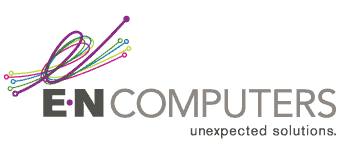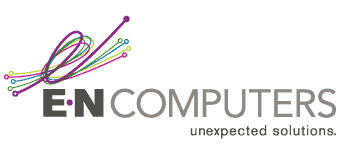

Content Contributor, E-N Computers
7+ years experience in healthcare IT and tech support.
I recently sat down with Ian MacRae, CEO and President of E-N Computers, to discuss the company’s history, the IT services industry, and where business technology is headed. This interview has been edited for clarity.
You’ve been working on computers for decades now. What did you start out doing? How did that develop into becoming a managed service provider?
Back then, we were a hardware reseller: we were reselling computers, building computers, and repairing them. But our clients would often bring back technology that was perfectly good, but they were having problems with it because it was not set up correctly and because it was not being proactively managed. Sometimes they weren’t buying the right technology to meet their needs, or they weren’t buying everything they really needed.
This was really a staffing problem disguised as a technology problem. In many cases, our customers didn’t have the right staff to develop an IT plan, to know what to buy, to properly integrate everything, or to proactively manage their technology.
Were there other MSPs in the area?
No, there were none. We were so far ahead of what anyone else was doing in 2007. There were people selling retainer contracts, but no one else was automating security patches or software updates the way we were.
So, there were other companies fixing things as they broke, but no true MSPs.
Exactly. Also, a true MSP, I think, knows who is on the network, has everyone using a backup solution they can support, and is religious about backup and disaster recovery processes. Nobody was doing that.
The real breakthroughs come when we solve an underlying problem instead of its symptoms. That requires having a complete picture of motivations and dynamics within a company, not just technical understanding.
Are there other shortcomings that you see among MSPs besides not taking advantage of automated processes?
Yes, IT leadership – people that are trying to work with management to reframe some of these problems so that they see that they have a staffing problem, not just a technology problem.
So sometimes what we think is just a technology problem might be a people or business process problem?
Right, and it takes different forms. In some cases, we need to train staff on how to access support. But it can also involve things like how we think about designing systems and processes throughout a company for better productivity and efficiency.

One thing that’s challenging is that, as an MSP, we are both consultants and are responsible for executing the plan. It’s like being on a football team and being both the coach and one of the players. Because we’re both giving advice and involved in executing, we are more exposed to receiving blame when things don’t go as planned.
To add to that, we’re a small business working with other small businesses. A common thing in small businesses is that everyone is wearing multiple hats. A result of that is that things get missed from time to time. We have processes in place to avoid that, but it still happens on occasion. So, building trust with our clients is essential. It can take considerable time to build that trust, but once we have it, great things happen. Especially because it allows our customers to focus on business functions more than their technology stack.
That’s understandable. How do you go about building that trust and maintaining open communication with clients?
The way we try to solve that is by having frequent client meetings, by being available for on-site support, and by having dedicated staff for each client instead of a rotation. We want to have a personal relationship. We’re not going to be as personal or as available as family or a dedicated employee, but we do make honest observations about the business that someone closer might be hesitant to make. Looking from the outside, we’re able to see the trade-offs being made and offer coaching and a degree of accountability.
And what about the aspects of the work that you enjoy the most?
I enjoy working to make complex things simple. The real breakthroughs come when we solve an underlying problem instead of its symptoms. That requires having a complete picture of motivations and dynamics within a company, not just technical understanding. This is an area where open communication and trust are essential to the success of our partnerships.
Do you sometimes feel like you’re solving a problem while missing part of the equation?
Yeah, and sometimes that’s because of a decision maker. If they have trust or control issues, those are more deep-seated things that must be called out and worked through. Sometimes a client wants to add technology to the solution when what they really need is another employee because their existing staff is simply overloaded. So, it’s important to have all the pieces in place to come up with an effective solution.
When it comes to those deeper issues, I’ve heard it said that the skills to start a business are different than the ones needed to grow and stabilize it.
Sure. Sometimes people see a technology problem where there’s really a decision-making or delegation problem. If you’re tired of technology being on your to-do list every day, give it to someone else. You may already have people in your organization that are capable of and even excited about taking on that responsibility. Trust the people you hire, delegate to them, or you risk losing them.
As a vendor, we’re insulated from the day-to-day dysfunction in your business. But it’s hard to have a strong, long-term partnership with a client that isn’t willing to adjust. Our ability to execute becomes dependent on something they’re not willing to do and that’s not sustainable.
Vendors are pushing people to the cloud and say it’s a great way to save money, but when you really start doing the math, they’re charging you for convenience, not savings. And when you start looking at the bill, it’s not even that convenient or simple.
What are some ways that you try to help clients grow and thrive? We’ve talked about automation and communication. What else would you say sets E-N Computers apart?
We’re trying to provide businesses with value, not just technical solutions. So, we have conversations about the organization as a whole and work to design a comprehensive solution that integrates technology rather than tacking it on. We’re also keen to introduce management tools and techniques that we have found internally useful. For example, EOS (Entrepreneurial Operating System) is a tool that helps managers get out of the way to help their teams do their best work. Managing well is a struggle for many small businesses, so we love to share what has helped us.
How do you see the business growing or changing in the near future?
Over the last decade or so there’s been a huge shift to the cloud and software-as-a-service. There’s a cloud service for everything. A technology that was originally designed to reduce complexity has re-introduced it to some extent. Trying to integrate all these cloud solutions into a cohesive process can be pretty darn complicated. And then tracing the route that information takes through those systems is complicated as a result.

Vendors are pushing people to the cloud and say its a great way to save money, but when you really start doing the math, they’re charging you for convenience not savings. And when you start looking at the bill, it’s not even that convenient or simple. Unnecessary expenses are also overlooked longer than they would be if you were talking about a large capital expense.
You’re able to benefit from people with current skills in a wide range of technologies and business applications.
How do you help people avoid those unnecessary expenses and get what they really need?
We have an experienced and knowledgeable team that can act like a full IT department for small businesses. So instead of relying on someone with outdated or limited knowledge, or on someone who is responsible for your old way of doing things, you’re able to benefit from people with current skills in a wide range of technologies and business applications.
And the truth is, you need that wide range of knowledge and skills to make everything work. We’d all love it if tech worked in flawless unison when plugged in. The best IT department is no IT department, right? But the reality is that technology and business processes must be continually kept aligned with each other.
We don’t want to stick with something just because it’s what a particular manager likes or because it’s the way something has always been done. We want to use technology to propel the business forward. We want to look past IT as a cost center and discover all the ways that it can drive value in an organization.
Take the IT Maturity Assessment

Is your business ready to weather changes, including employee turnover? Find out by taking our IT maturity assessment.
You’ll get personalized action items that you can use to make improvements right away. Plus, you’ll have the opportunity to book a FREE IT strategy session to get even more insights into your IT needs.

Industries
Locations
Waynesboro, VA
Corporate HQ
215 Fifth St.
Waynesboro, VA 22980
Sales: 540-217-6261
Service: 540-885-3129
Accounting: 540-217-6260
Fax: 703-935-2665
Washington D.C.
1126 11th ST. NW
Suite 603
Washington, DC 20001-4366
Sales: 202-888-2770
Service: 866-692-9082
VA DCJS # 11-6604
Locations
Harrisonburg, VA
45 Newman Ave.
Harrisonburg, VA 22801
Sales: 540-569-3465
Service: 866-692-9082
Richmond, VA
3026A W. Cary St.
Richmond, VA 23221
Sales: 804-729-8835
Service: 866-692-9082
